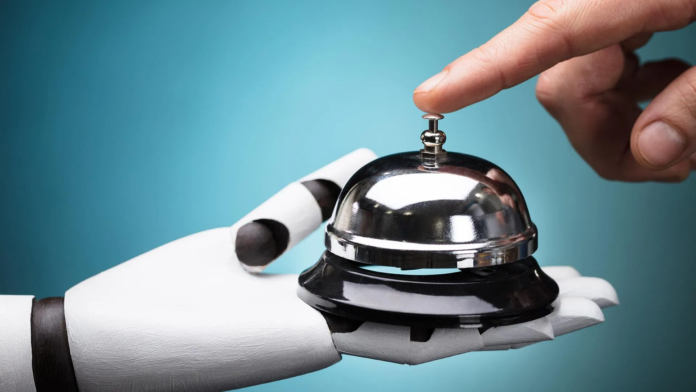Automation is rapidly transforming various industries across the globe, and the hospitality industry is no exception. The incorporation of automation technology is changing the way the hospitality industry operates, from customer service to backend operations. Automation in the hospitality industry is aimed at streamlining processes, reducing costs, and enhancing customer experiences. Here’s a closer look at how automation is revolutionizing the hospitality industry.
1. Self-Check-In and Check-Out
One of the most significant advancements in the hospitality industry is self-check-in and check-out systems. With the help of automated check-in kiosks, guests can skip the lengthy check-in process and complete the process within seconds. Automated check-out systems allow guests to settle their bills, return keys, and receive their receipts without the need for human interaction. This automation not only saves time but also provides a smoother experience for guests and helps hotels cut costs by reducing the need for front-desk staff.
2. Chatbots and Virtual Assistants
Chatbots and virtual assistants have become popular ways for hotels to provide 24/7 customer support. Chatbots can handle frequently asked questions, such as check-in and check-out times, and room service requests, and provide directions to local attractions. Virtual assistants can help guests make reservations, order room service, and even control the room’s temperature and lighting. These automation tools not only provide convenient service but also free up staff members to focus on more complex tasks.
3. Data Analytics and Personalization
Automation tools such as data analytics and personalization software help hotels understand their guests’ preferences and behavior patterns. With the help of these tools, hotels can customize their services to cater to individual guests’ needs. For example, if a guest frequently orders room service, the hotel can use this information to offer personalized recommendations. By tailoring services to individual guests, hotels can provide a more personalized experience, which can lead to increased loyalty and repeat bookings.
4. Housekeeping Automation
Automation in housekeeping has made it easier for hotels to manage their operations more efficiently. Hotels can use automated systems to track and manage housekeeping schedules, including cleaning schedules, laundry services, and room turnovers. Robotic vacuum cleaners and cleaning robots can clean rooms and common areas, freeing up staff to focus on more complex tasks.
5. Inventory Management and Procurement
Inventory management and procurement are critical aspects of running a hotel. Automation in this area can help hotels manage their inventory more efficiently, reducing waste and cutting costs. Automated systems can track inventory levels, order supplies when needed, and even adjust orders based on demand. By automating inventory management and procurement, hotels can ensure that they always have the supplies they need without overspending on unnecessary items.
6. Revenue Management
Automated revenue management systems help hotels optimize pricing and maximize revenue. These systems use data analytics to predict demand and adjust room rates in real time, ensuring that hotels are pricing their rooms competitively and maximizing revenue.
7. Digital Signage and Wayfinding
Digital signage and wayfinding systems are increasingly being used in hotels to provide guests with information and directions. These systems can be used to display menus, promote hotel services, and provide directions to local attractions. By providing guests with clear and easy-to-follow directions, hotels can enhance their guest experience and reduce confusion.
8. Food and Beverage Automation
Automation in food and beverage operations can help hotels improve efficiency, reduce waste, and enhance the guest experience. For example, automated ordering systems can speed up the ordering process, reduce errors, and help guests customize their orders. Additionally, automated inventory management systems can help hotels track their food and beverage inventory, reduce waste, and order supplies more efficiently.
9. Security Automation
Automated security systems can help hotels improve guest safety and security. These systems can include automated access control systems, CCTV cameras, and alarm systems. By using these systems, hotels can monitor their properties more effectively and respond quickly to security threats.
10. Mobile Apps
Many hotels are now offering mobile apps that allow guests to manage their bookings, check in, and access hotel services using their smartphones. These apps can provide guests with a more convenient and streamlined experience, and can also help hotels reduce costs by reducing the need for staff to manage these tasks.
11. Energy Management
Automation technology can help hotels manage their energy usage more efficiently. For example, automated lighting and temperature control systems can adjust lighting and HVAC settings based on occupancy levels, reducing energy waste and lowering costs. Additionally, energy management systems can monitor energy usage and provide data to help hotels identify areas where they can reduce energy consumption.
12. Virtual and Augmented Reality
Virtual and augmented reality technologies are increasingly being used by hotels to enhance the guest experience. These technologies can be used to provide virtual tours of the hotel, showcase amenities and services, and even allow guests to visualize different room configurations. By providing guests with a more immersive experience, hotels can differentiate themselves from their competitors and provide a more engaging and memorable stay for their guests.
Conclusion
Automation is transforming the hospitality industry in many ways, from improving guest experiences to enhancing operational efficiency. As technology continues to evolve, it is likely that hotels will continue to find new and innovative ways to use automation to enhance their operations and provide better service to their guests. Check more articles on Techdazed.

